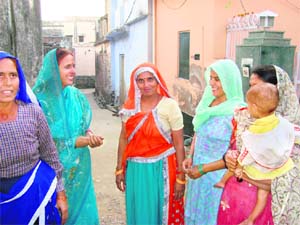|
Foeticide fighters
These feisty women
take on the might of the jatland to secure justice for
women and prevent female foeticide, writes Nitin
Jugran Bahuguna
|

Sarpanch Maya (second from left) of Teent village with local women. According to Maya, her village is the only one in Rewari district of Haryana where the sex ratio is even
|
Bimla
Devi, 57, of
Basduda village in Rewari district of Haryana is no stranger to
social boycott and ridicule. Socially ostracised by both men and
women of her village, denied public services from local
tradesmen and public transport operators and even brutally
beaten up once while holding a women’s meeting at her home,
this diminutive-sized woman has displayed hidden strength in
dealing with her detractors.
Today, she is
known as "Bimla pradhan", even though she is
not an elected representative, because of her relentless efforts
to secure justice for the most underprivileged in the community
— women.
Whether it is
domestic violence, adult education for women or promoting the
health and well-being of the girl child by campaigning against
female foeticide, Bimla is at the forefront, often collaborating
with the district authorities and taking to task errant
families, some of whom still harbour feelings of resentment
against her.
"I have faced
opposition ever since I started my community activities by
facilitating an adult education centre for women in my village
about 20 years ago," says Bimla. She was instrumental in
mobilising the village women to organise themselves into a sangathan
for collective action on issues affecting women’s well-being.
"Once, during a meeting at home, a few men, armed with
sticks, entered and attacked us. No villager came to our
rescue," she recalls.
Now, she is on a
mission to spread awareness against female foeticide. "The
district administration has a committee against female foeticide
and they have asked for my help," she reveals. At the same
time she is critical of the authorities and questions their
sincerity in tackling the issue. To illustrate this, she refers
to a recent case. Bimla says she found out that her neighbour’s
pregnant wife was planning to get an ultrasound test done.
"I followed the couple to a Rewari hospital and had to
phone the Chief Medical Officer of the hospital to prevent them
from getting the procedure done."
However, the wily
couple kept moving from one hospital to another, changing taxis
to deter Bimla. "After a while, I had to give up as I ran
out of money. I later heard that they had got the test done and
left the village to get the foetus aborted as it was a
girl," she rues.
Bimla can take
heart from the fact that at least one Haryana village in her
district seems to have woken up to this crime against the unborn
girl, and the credit for that must go to the village’s female
formally elected sarpanch.
When Maya Yadav,
50, of Teent village in Rewari was elected to the post of the
seat reserved for women, she was initially indifferent to her
responsibilities and let her husband manage the official duties.
However, members of two women sangathans in the village
motivated her to take interest in Panchayat activities.
Soon, Maya got
involved in various social and developmental issues of the
village. "I realised that the well-being and progress of
our community could only be achieved by empowering women and
protecting the rights of girl children," she recalls.
Because of her efforts, today every girl in the village attends
school.
Maya also claims
that her village is the only one in the district where the sex
ratio is even. This is no mean feat given that Haryana has one
of the lowest gender ratios in the country with 861 women per
1,000 men, according to the 2001 Census.
She attributes
this achievement to a number of factors. "The community
rallies around parents of girls financially at the time of
marriage. This prevents people from viewing the girl child as a
financial burden," she explains.
"Also, we
have stopped the practice of dowry. For this, we had to actually
sensitise women more than men. Now, the practice of buying and
displaying dowry items has stopped because we would not go to a
wedding venue where we heard dowry was being collected,"
she adds.
This exemplary act
of Teent villagers has inspired women’s sangathans across the
district. "We have been networking with other sangathans in
the district and over the years have attempted to prevent female
foeticide, on an average dealing with 15 to 20 cases a
month," informs Bimla. They succeed at times in preventing
gender-specific abortions, but often their efforts fail.
"There are two reasons for this failure. Firstly, the
preference for the male child is so strong that no amount of
reasoning or threats make any difference to the errant
family," observes Sunder Lal, Director of the Social Centre
for Rural Initiative and Advancement, a local NGO.
"Secondly, such abortions form a well-entrenched business
with a large network of beneficiaries," he adds.
The situation is
difficult but it does not dishearten women like Bimla. She
claims that in fact it only "inspires us women to fight
even more vigorously for the right of the unborn girl
child." — WFS
|